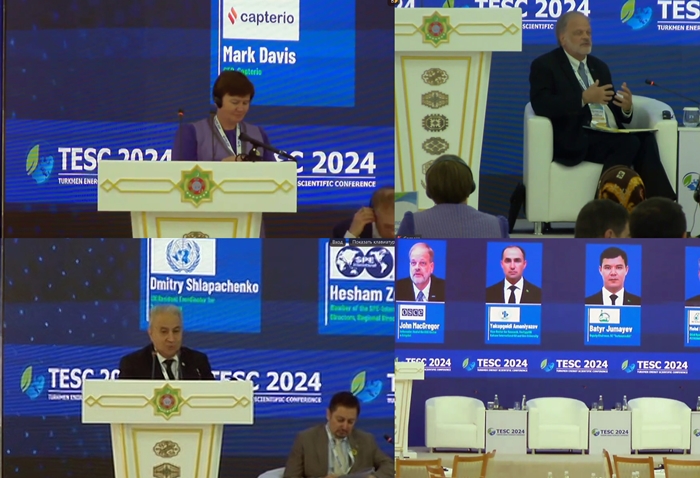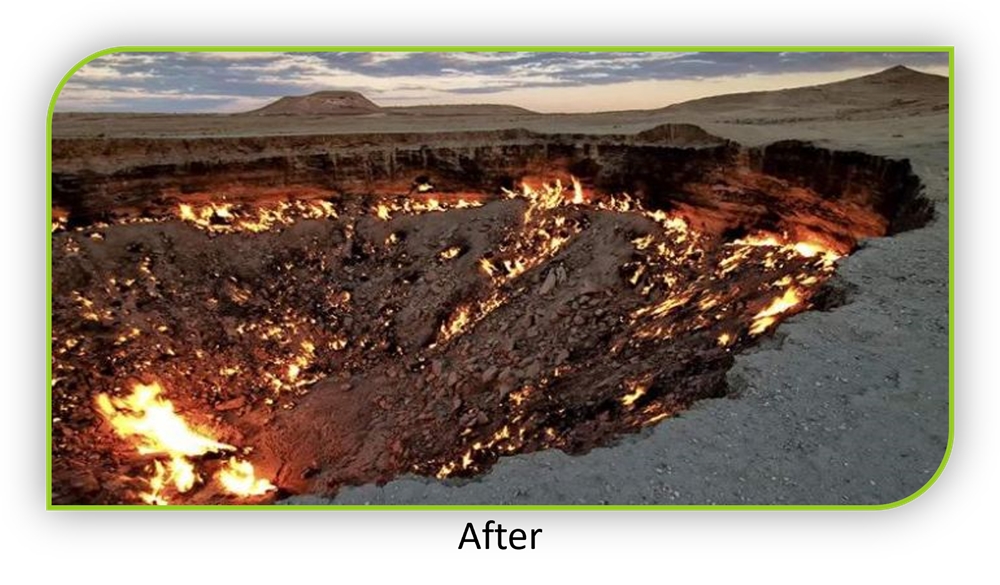On 5-6 June 2024, Ashgabat hosts an international scientific conference: “Energy perspectives, new technologies and environmental aspects in the development of hydrocarbon resources”, organized by the state concerns Turkmengaz and Turkmennebit, the State Corporation Turkmengeologiya in cooperation with the Turkmen-Forum and the British company GaffneyCline.
Double the attendance from last year, the conference brought together 270 delegates from 33 countries. This surge reflects a growing global focus on greening the energy sector and environmental protection.
High-level attendees included heads of Turkmen energy companies, representatives from international oil and gas firms, delegates from research centers and international organizations.
The first day’s program, featuring a plenary session and three thematic discussions, addressed critical topics like energy transition, reduced methane emissions from hydrocarbon production, green energy initiatives, and financing.
Speakers tackled burning issues relevant not just to Turkmenistan, but to the entire global energy sector.
Naturally, the need to intensify efforts to introduce green solutions to meet the growing energy needs of the population, economy, and transport was highlighted. However, as the speakers from the Turkmen side emphasized, despite calls for a complete transition to alternative energy sources, there is a growing understanding that the oil and gas industry should be part of the climate dialogue and a key driving force for climate solutions.
“Given that the oil and gas sector currently provides 55% of the world’s energy and has the financial capacity to implement large-scale projects in the energy transition, the experience of the oil and gas industry is especially important in technologies such as carbon capture and the production of alternative energy sources. In other words, the goal should be to decarbonize fossil fuels, rather than their abandoning,” said the main speaker of the plenary session, Deputy Chairman of the State Concern Turkmengaz Shageldy Hangeldyev.
Decarbonization of the hydrocarbon sector
Decarbonizing the oil and gas industry, particularly the extraction sector, requires a two-pronged approach: reducing carbon dioxide (CO2) emissions during production and implementing efficient extraction technologies. Positive steps are already underway. Several projects are actively pursuing these goals.
Turkmenistan’s long-standing partner in the oil and gas industry, Dragon oil (UAE), has already outlined plans to stop flaring gas at its assets in Turkmenistan.
Dragon Oil produces around 55 thousand bopd from offshore near Hazar. 100% of the associated high pressure gas is used offshore for re-injection or Gas Lift. Low pressure gas delivered to local market. Remaining low pressure gas is flared (offshore and onshore). By adding compression, low pressure gas would be re-pressurized to be used for Injection/Lifting Operations. In this way, flaring of gas can be avoided, told Roberto Espinosa, reservoir development manager at Dragon Oil.
Radiance of the Karakums minimizes methane emissions
The conference also spotlighted another Turkmen success story in curbing methane emissions: the “Radiance of Karakum” gas crater.
This 60-meter wide, 20-meter deep fiery phenomenon is a captivating tourist attraction, but scientists have identified it as a source of harmful ecological emissions.
Irina Luryeva, head of the laboratory at the Turkmengaz Scientific Research Institute of Natural Gas, presented a compelling case. The team of Turkmen scientists significantly reduced emissions by drilling a well near the crater. This well taps into a massive gas reservoir, diverting gas flow away from the crater and minimizing uncontrolled emissions.
Looking ahead, Luryeva proposes converting a nearby observation well into an operational well. This would allow for intensive extraction from upper gas layers, further reducing emissions from the crater.
Presentation slides showcased dramatic before-and-after photos, highlighting the visible decrease in the crater’s burning intensity.
Renowned explorer George Kourounis, who famously descended into the Darvaza fire crater in 2013, hailed Turkmenistan’s success in reducing emissions from the “Radiance of Karakum” crater during his presentation.
Kourounis, a popular science communicator, expressed hope that future expeditions to Turkmenistan will build on this success and provide an even more detailed picture of the craters’ condition.
The upcoming expedition focuses on furthering the study of life within the crater, particularly extremophile microbes. Kourounis’ team plans to collect samples for DNA analysis and analyze gas emissions to understand the composition and volume of released gases, as well as combustion efficiency.
Kourounis envisions extensive educational outreach. He plans to share research results from Turkmenistan through interactive live-streamed science lessons for viewers worldwide.
Green energy and financing
The participants of the third session of the forum reviewed initiatives to promote green energy and new financing opportunities.
The session was moderated by Lyubov Ivleva, Deputy General Director for Strategic Development of the System Transneft Company. The speaker presented a wide range of technological solutions and various types of equipment manufactured by the company. “We see great potential in the development of partnership relations between the enterprises of the fuel and energy complex of Turkmenistan and STN, taking into account each other’s interests and on a mutually beneficial basis. We are ready to share many years of experience and technologies for the creation and maintenance of the most cost-effective systems, as well as to use the production capabilities of Transneft for this purpose. This will further ensure the growth and development of the oil and gas sector in Turkmenistan — and with strengthening in the long term,” the speaker said.
The British Ambassador to Turkmenistan, Stephen Conlon, highlighted in detail the financing opportunities offered by the UK Export Finance (Export Credits Guarantee Department). UKEF provides attractive financing terms for overseas buyers of British goods and services, which can help exporters make their offers more competitive. Financing provided either via a bank guarantee, where UKEF acts as a credit enhancer, or in limited circumstances via direct Iending with additional capacity (£2bn) for clean growth projects in sectors such as transport infrastructure, healthcare, agriculture, renewable energy.
Rejepmyrat Ishankuliyev, Associate Professor at the Military Institute of the Ministry of Defense of Turkmenistan, noted that 2020 saw a record-breaking $501.3 billion poured into renewable energy, primarily solar and wind power. However, Ishankuliyev expressed concern that these sources may not be enough to address rising global temperatures.
His report focused on vast potential of geothermal energy. He emphasized its vast potential to provide humanity with 24/7 clean electricity and thermal energy, offering a reliable, baseload renewable source.
Hope for a new Regional climate technology center in Turkmenistan is on the rise
Magtymguly Akmuradov, Climate Advisor to the Ministry of Foreign Affairs, provided an update on progress towards establishing the Regional center for climate Technologies for Central Asia.
The center’s mission: identifying and transferring climate change adaptation technologies for Central Asia.
Akmuradov acknowledged the challenge of translating international agreements (like COP conferences) into action. He pointed to a key resolution from COP 27 requiring developed nations to share climate adaptation technologies freely with developing countries. However, he noted a lack of concrete progress following this agreement.
Back in 2012, Turkmenistan proposed establishing a regional center at the Rio+20 conference.
Significant momentum has been building recently. A memorandum between the Ministry of Environmental Protection and UNEP was signed in October 2023. Additionally, consultations regarding the center’s project are underway at the ongoing Bonn climate change conference.
Akmuradov expressed hope for a final decision at COP 29 in Baku this November. He also highlighted Turkmenistan’s commitment to funding the center’s activities for its first five years.
***
On June 6, the conference will continue its work in two sessions. One of them, on the theme “Enhancing energy security and energy systems resilience through energy connectivity and trade”, will be organized jointly with the United Nations. The final session, organized jointly with the Society of Petroleum Engineers (SPE), will be devoted to the utilization of CO2 and sulfur dioxide in the production of hydrocarbon resources. ///nCa, 5 June 2024
More materials on TESC 2024:
Technologies for developing gas fields with low hydrogen sulfide content and usage of carbon dioxide
Carbon Dioxide Gas and Sulfur in the Production of Hydrocarbon Resources
Emissions Reduction of Greenhouse Gases – Strategy of State Concern Turkmennebit of Turkmenistan



